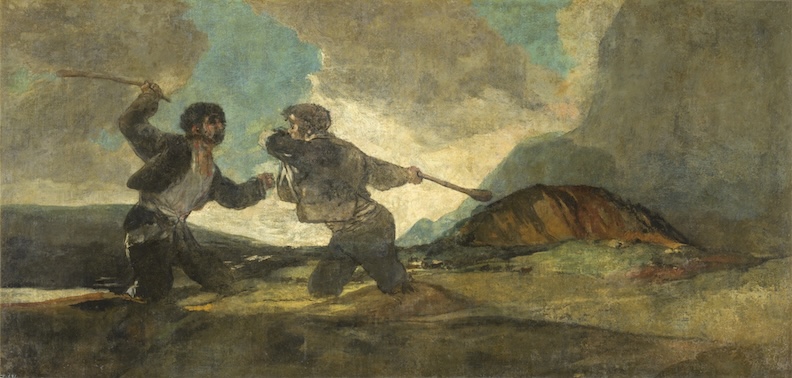In January, Supreme Court Justice Sonia Sotomayor offered a “courtesy visit” to Panama, invited by her longtime friend, U.S. Ambassador Mari Aponte, “to highlight the values shared by the United States and Panama,” such as the defense of democracy and human rights. Meeting with various local groups and organizations, Justice Sotomayor answered all manner of questions, including queries about her favorite books. Besides the Nancy Drew series, she cited Lord of the Flies and explained that the book shows that humans do not naturally understand right and wrong, but must be taught it by others.
Coming from someone who was educated in Catholic schools, that’s a curious opinion. It flies in the face of natural law theory as taught by the Catholic Church for over a millennium. The Catechism of the Catholic Church states: “The natural law is written and engraved in the soul of each and every man, because it is human reason ordaining him to do good and forbidding him to sin.” In other words, every human being from the very beginning of life understands, albeit inchoately, right from wrong.
One might ask, does it matter? Does it matter if we as a society believe that children have some inner conception of right and wrong? Or, alternatively, that their conception of morality is formed solely from external sources instructing them? Don’t even those who believe that children have an internal sense of right and wrong still feel the need to instruct them, carefully guiding their development? What’s the difference?
Quite a bit, actually.
One question provoked by Justice Sotomayor’s thesis is: Can we even be formed with extrinsic principles of law and morality if indeed there is no tendency within us toward the moral good? Without such an inclination, external principles can do nothing to attract us to it.
We would be little more than automatons to be manipulated to others’ own purposes and pleasure. Perhaps that is why our contemporary culture has hopes for (or fears about) artificial intelligence: we think we can craft machines that imitate, and ultimately replace human beings.
Sotomayor’s thesis would also seem to undermine the idea that there is a law common among all peoples, since, left to our own devices, we would be incapable of realizing the good, even on a natural level. Law, then, would be an entirely arbitrary and subjective human enterprise, rather than one built into the human condition, which of course needs guidance and direction, but is nevertheless consistently identifiable across all peoples.
If law and morality are purely ad hoc, it’s unclear on what basis we can dictate to others what behaviors they must perform or avoid, besides a naked appeal to coercive power.

St. Thomas Aquinas argues (ST Ia-IIae, 94, a.2) that the precepts of the natural law are “self-evident principles,” including the principle that those things to which man is naturally inclined are naturally apprehended as being good. There are, argues Aquinas, basic inclinations to the good that are inalienable from human beings: those things necessary for the preservation of human life, warding off obstacles, sexual intercourse for the purpose of propagating our species, education of offspring, knowing truth and avoiding ignorance, and living in society.
Granted, one may err in perception of what will further the realization of these goods (say, killing a man and stealing his wife in order to sire one’s own child), but that only reflects an obscuring of the good by vice, not its obliteration. Children conceived via immoral circumstances are still, after all, good.
Thus Aquinas (Article 4 of the same Question) cites St. Isidore of Seville: “The natural law is common to all nations.” This is why, for example, so many varied cultures have prohibitions against such vices as murder, theft, or adultery. They may, of course, draw the lines in different places over what constitutes such social evils, but few cultures, and certainly no advanced civilizations, are without laws to limit vice, precisely because it is detrimental to another identified good: man living in community.
So yes, passion, habit, or miseducation can weaken our natural inclinations to the good, but these are aberrations and distortions of the natural law.
What Catholic natural-law teaching offers us, then, is a happy medium between a cheery, Pelagian optimism that envisions a utopian future given the right circumstances, and a radical depravity ontology that is sometimes implied by Lutheran anthropology – and by Justice Sotomayor’s recent remarks in Panama. The former paradigm downplays, if not eliminates the role of human culpability for our sinful world. The latter reduces humans to beasts motivated only by coercive sticks and carrots, rather than appeals to their natural inclinations.
Justice Sotomayor’s opinion on human nature and law is popular in contemporary culture, and especially among our elite professional class. So it’s little wonder that we perceive in technology the answer to all human aspirations. Men and women don’t require loving formation in virtue that helps them become their full, unique selves manifesting the glory of God, but rather proper programming from a beneficent motherboard.
This pessimistic outlook is in perfect harmony with “snowflake” dogmas that prioritize the autonomous self. It’s what reactionary feminist Mary Harrington calls “meat lego Gnosticism,” in which the human body becomes nothing more than interchangeable parts.
Such trends seem to be orienting us not towards a bright technological utopia, but the anti-human dystopia depicted in Lord of the Flies, in which stranded British boys devolve into violent, feral beasts.
That they, and we, can be driven to such evils comes not from our natural inclinations to the good, but their twisting by the real “lord of the flies” the literal translation of Beelzebub. (2 Kings 1). If that’s the case, then no laws or tools can save us, but only the One who via revelation and natural law directs and elevates our inherent yearnings to their proper end.














